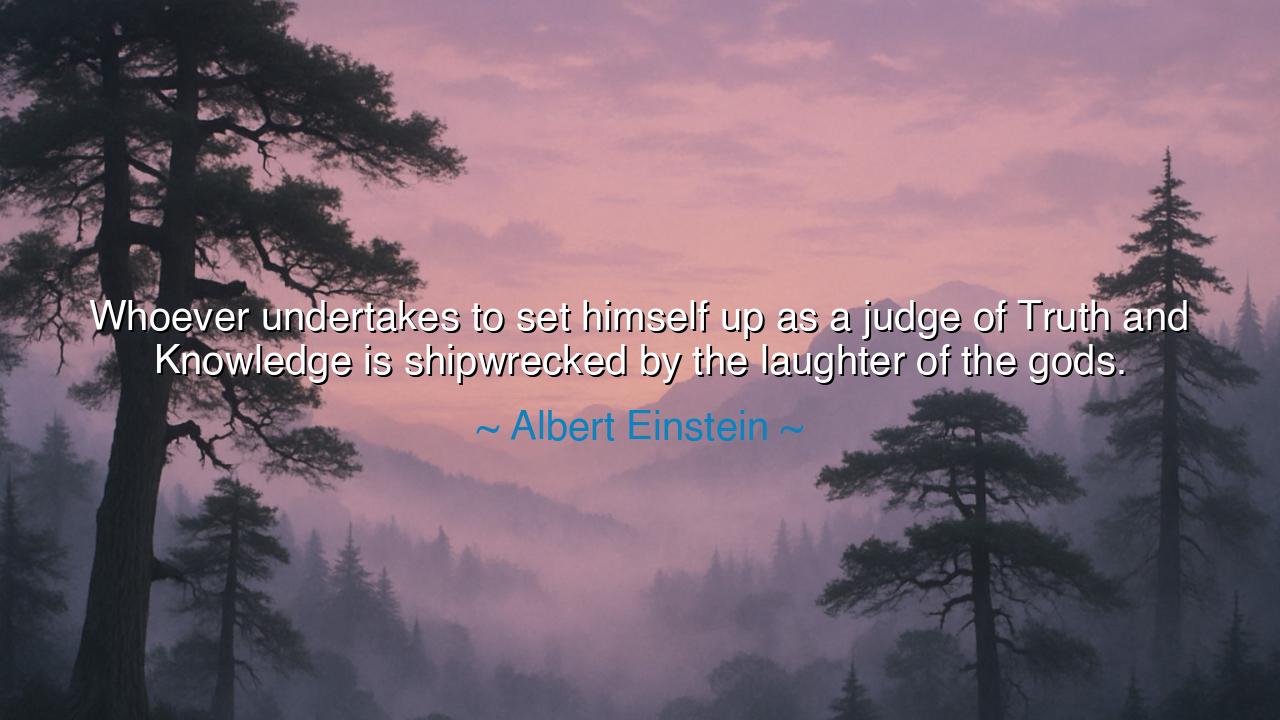
Whoever undertakes to set himself up as a judge of Truth and
Whoever undertakes to set himself up as a judge of Truth and Knowledge is shipwrecked by the laughter of the gods.






“Whoever undertakes to set himself up as a judge of Truth and Knowledge is shipwrecked by the laughter of the gods.” – Albert Einstein
In these radiant and humbling words, Albert Einstein, one of the greatest minds to ever walk the earth, speaks not as a scientist but as a sage. His voice, filled with both reverence and warning, reminds us that the pursuit of Truth and Knowledge is sacred ground, where arrogance leads to ruin. The man who believes himself the final authority on truth becomes not wise, but blind—blinded by his own certainty, deaf to the whispers of mystery that surround him. Einstein, who peered deeper into the fabric of the universe than most mortals ever will, knew that knowledge without humility is a ship without a compass, doomed to break upon unseen reefs. The laughter of the gods is not cruel mockery, but divine irony—the eternal reminder that even the wisest among us know but a drop of the infinite ocean.
The meaning of this quote lies in the paradox of wisdom itself. True understanding begins where pride ends. To set oneself up as a judge of Truth is to assume mastery over that which is eternal, vast, and unknowable. The universe does not yield its secrets to the proud, but to the patient. The one who proclaims “I know” has already ceased to learn; he builds walls where there should be windows, certainty where there should be wonder. The gods laugh not to belittle man, but to awaken him—to remind him that knowledge, however great, is only a fragment of a divine tapestry too immense to grasp. Thus, Einstein teaches what the ancients knew: that wisdom is born not from certainty, but from awe.
The origin of these words lies deep within Einstein’s own experience as both a man of science and a seeker of truth. Though he revolutionized physics with his theory of relativity, Einstein never allowed himself to believe he had conquered the universe. On the contrary, his discoveries filled him with greater humility. He once said, “The more I learn, the more I realize how much I don’t know.” It was this humility that separated him from lesser minds who sought fame through knowledge. To him, the scientist was not a judge, but a servant of truth—an explorer in the endless sea of mystery. The “laughter of the gods” was a poetic acknowledgment that whenever man’s ego declares itself supreme, the universe humbles him swiftly.
History has shown this truth again and again. Consider the tale of Aristotle, the philosopher who, though brilliant beyond measure, once declared that heavier objects fall faster than lighter ones. For centuries, his word was treated as law, unchallenged by the scholars who revered him as the judge of knowledge. Yet it was Galileo, a thousand years later, who climbed the tower of Pisa and proved otherwise. In that moment, Aristotle’s error became a lesson in humility, and Galileo’s courage became a hymn to truth. The gods laughed—not in cruelty, but in delight, for the torch of understanding had passed to another who dared to question. The story teaches us that truth is not owned—it is pursued, and that every generation must walk the path anew, guided not by pride, but by curiosity.
Einstein’s warning, then, is not only for scientists, but for all who seek wisdom. In every age, there are those who mistake knowledge for power, who wield truth like a weapon rather than a light. They build thrones of intellect and sit upon them as kings, declaring themselves arbiters of what is real. Yet sooner or later, time erodes their kingdoms, and new discoveries reveal their folly. The wise understand that to judge truth is to misunderstand it—that truth is not something we own, but something that owns us. The gods laugh because they know that all human understanding is but a fleeting flicker in the eternal dawn.
And yet, within this laughter lies compassion. For Einstein’s message is not to despair of knowing, but to revere the search itself. The true seeker does not demand mastery; he listens, he wonders, he kneels before the vastness of creation. To seek knowledge rightly is to approach it as a pilgrim, not a conqueror. The proud may be shipwrecked by their arrogance, but the humble are carried forward by curiosity, by reverence, by the quiet joy of discovery. This humility is the vessel that keeps the seeker afloat amid the infinite sea of truth.
The lesson we must draw is timeless: let us pursue knowledge with passion, but never with pride. Let us remember that no matter how high we climb the mountain of understanding, the horizon will always stretch beyond our sight. Every truth we uncover is but a fragment of a greater mystery. Therefore, walk humbly with your knowledge; let it make you kind, not arrogant; open, not closed. Seek truth not to rule others, but to better serve the world.
For as Einstein teaches, when we stand before the vastness of creation and confess, “I do not know,” the gods do not laugh—they fall silent. For in that moment, humility becomes wisdom, and the human heart aligns, at last, with the eternal rhythm of the divine. To know thy smallness is the beginning of all greatness.






AAdministratorAdministrator
Welcome, honored guests. Please leave a comment, we will respond soon